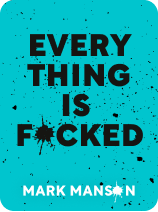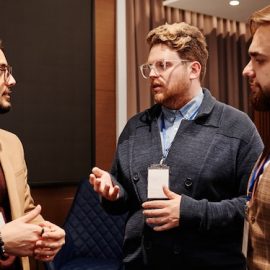

This article is an excerpt from the Shortform book guide to "Everything Is F*cked" by Mark Manson. Shortform has the world's best summaries and analyses of books you should be reading.
Like this article? Sign up for a free trial here.
Why are we becoming more and more unhappy despite improved living conditions? Why do we have a mental health crisis?
Mark Manson argues that the hope that makes us feel fulfilled inevitably leads us to harm ourselves and others. Thus, to be happy as individuals and thrive as a species, we need to find a source of fulfillment that doesn’t rely on hope for a better future.
Keep reading for an overview of Mark Manson’s Everything Is F*cked.
Everything Is F*cked by Mark Manson
Although our living conditions are generally better than they’ve ever been, people are getting steadily unhappier. Depression, anxiety, and overall dissatisfaction with life are all statistically on the rise. According to Mark Manson’s Everything Is F*cked, this paradox is due to our physical living standards not determining our happiness. Rather, we’re happy if we have something to hope for—in other words, if we believe that we can change things for the better. Our mental health crisis is due to many people losing hope and feeling that their lives are increasingly meaningless.
The solution to this problem is complicated. Many assume that, to feel fulfilled, we need something to hope for—to discover meaning by focusing on the positive impact we can have on the world. However, in Everything Is F*cked Mark Manson argues that the hope that makes us feel fulfilled inevitably leads us to harm ourselves and others. Thus, to be happy as individuals and thrive as a species, we need to find a source of fulfillment that doesn’t rely on hope for a better future.
Manson began his career as a blogger writing advice on dating, eventually expanding his blog to offer overall life advice. Everything Is F*cked is his follow-up to his 2016 best-selling self-help book The Subtle Art of Not Giving a F*ck. Manson builds on the ideas in Subtle Art, elaborating on them and applying them to society at large.
What Is Hope, and Why Do We Need It?
Before we discuss how our relationship to hope changes as we mature, let’s clarify exactly what we mean by “hope” and explain how it functions.
In Everything Is F*cked, Mark Manson defines hope as the belief that you have the ability to progress toward something valuable and create a more pleasant future. Additionally, he asserts that you need other people to recognize that what you do matters to sustain hope—social validation is a core psychological need.
We feel like we need hope because we understand we’re mortal, according to Manson. If you zoom out in time long enough, you and everyone whose life you’ve ever influenced will eventually die, and nothing you do can change that. This is an inherently depressing thought.
For this reason, to feel motivated to do anything, we need hope. Hope empowers us to cope with the inherent pain of existence. If we believe that we’re successfully creating a more pleasant future for ourselves and those around us, we’ll feel fulfilled, even if life at the moment is unpleasant. As long as we believe pleasure is coming later, working toward that pleasure provides a deeper satisfaction that transcends pain now—we feel good about what we’re doing even if it doesn’t feel good in itself. In this way, hope gives us the ability to delay gratification: to trade pain now for greater pleasure down the road, and to feel satisfied while doing it.
Stage 1: An Unhappy Life Without Hope
In Everything Is F*cked, Mark Manson explains that we all begin life without hope: As young children, we lack the ability to imagine the future, so we can’t comprehend the idea of doing something unpleasant for a greater purpose. Instead, we try our best to move toward immediate pleasure and away from immediate pain.
With this in mind, you may assume that as soon as our brains develop enough to imagine a better future, we’ll learn how to hope. Unfortunately, for most people, hope is not this easy to attain. In the next few sections, we’ll explain why it’s difficult to find hope, describe the painful consequences of a life without hope, then detail what a hopeless person can do to find hope.
For example, say a logging company is planning to cut down the beloved woods near your neighborhood. Driven by the hope that you can stop them, you spend countless, tiring hours contacting local politicians and recruiting others to join your cause. You’re trading the pain of these exhausting efforts now for the promise of a future where the woods remain. Those hours spent fighting the logging company don’t feel good in themselves, but you find this overall pursuit toward a better future fulfilling. Meaningful causes like this are the primary way we find satisfaction in an inherently painful world.
Life Without Hope Is Painful
According to Mark Manson’s Everything Is F*cked, people who fail to find a source of hope must face the painful meaninglessness of existence and consequently must endure one of two suffering-filled life experiences: First, they may try to distract themselves by relentlessly pursuing pleasure. Unfortunately, pleasure is a fleeting experience, and they’ll spend their lives desperately trying to feed an insatiable craving.
Second, Manson explains that people without hope may try to numb the pain of existence by suppressing all their emotions. This kind of hopelessness manifests as apathy and depression—instead of relentlessly trying to feed a craving, people lack the motivation to do anything at all, languishing at a baseline of dull pain. These two life experiences are becoming more common, contributing in large part to today’s mental health crisis.
What to Do If You Feel Hopeless
Manson offers two main strategies for cultivating hope. First, find hope by changing your beliefs about yourself. Reflect on your past experiences and find a way to reinterpret them so you believe that you do have the ability to attain something of value, rather than believing that you’re inherently worthless and powerless.
Second, Manson argues that you can cultivate hope by aligning your emotions with your values. In other words, encourage yourself to feel good about doing the “right thing” and feel bad about doing the “wrong thing.”
Most people fail to realize that, ultimately, emotions control all our behavior. We assume that we use logic to decide what to do unless our emotions steer us off course—but, biologically, the truth is the other way around. Manson explains that emotions are the mechanism by which our brains push our bodies into action. If we feel like doing something, we do it, and if we don’t feel like doing something, we don’t. For this reason, when it makes you feel good to lead a disciplined life and progress toward a better future (which is necessary to feel hope), you’ll do it automatically and effortlessly.
To align your emotions with your values, Manson states that you must learn to regulate your emotions. To do this, first, cultivate awareness of your emotions and unconditionally accept that it’s OK to feel them. Shaming yourself for any emotion will only make you feel worse about yourself, which will make it more difficult to act. Then, remind yourself how good you’ll feel after you’ve done the “right thing.” By anticipating a pleasant future, you’ll become excited to spring into action. Regulating your emotions in this way is the only way to build self-discipline, according to Manson.
Stage 2: A Hopeful Life
Once you manage to align your emotions and values, you reap the benefits of a life with something to hope for. It feels like your life matters, and you find satisfaction in trading pain in the present for a future without pain. Unfortunately, Mark Manson argues in Everything Is F*cked that this worldview also results in a life of suffering—and the vast majority of people live by it. The even worse news is that hope is what motivates us to make others suffer, as we’ll see.
Hope Requires Ideology
Recall Manson’s definition of hope: You believe that you have the ability to pursue something of value and have others recognize you for it. People often disagree on what constitutes the “something of value” that you should pursue. Further, people clump together in groups based on shared values, reinforcing each other’s beliefs and encouraging one another to keep pursuing what they believe is valuable.
Manson calls these groups “religions,” but we’ll use the broader term “ideologies,” since they include both spiritual groups and secular groups. Ideologies like this include political parties, religious faiths, and corporations—any group of people pursuing something they find more meaningful than anything else.
Every ideology has a primary virtue, something adherents believe is more valuable than anything else (Manson calls this primary virtue a “God Value”). Political parties value political control above all else. Religious faiths value spiritual obedience above all else. Corporations value profits above all else. The members of every ideology share a key belief: By pursuing our primary virtue, we can trade pain in the present for a less painful future. This belief is what gives them hope. Manson claims that every source of hope is an ideology of some kind.
Ideology Causes Us to Suffer
Manson argues that, unfortunately, the hope you get from an ideology will always cause you to suffer. No ideology can always deliver on its promise of a less painful future because life is and always will be painful. This is true on a biological level: No matter what your external circumstances are in life, your brain will always settle into a state of dissatisfaction. This is what helps us survive—evolutionarily, constant dissatisfaction is what motivates us to keep engaging in productive action.
While many ideologies successfully help people improve their lives, no ideology can continue to improve your life indefinitely, giving you a perfect, painless life. This is disastrous because, when an ideology can no longer give you a better future, it can no longer be a source of hope.
How to Practice a Life Without Hope
To live a life without hope, Mark Manson recommends the following rule in Everything Is F*cked: Never use a human (including yourself) solely as a means to some other goal. This means that under no circumstances is it justified to sacrifice someone else’s ability to live a meaningful life. For example, you could morally campaign to get a responsible political figure into office, but you could never morally assassinate a cruel political dictator to do so—this would be using that dictator’s human life as a means to achieve your political goal.
Manson asserts that this life philosophy will also radically improve your relationship with yourself. When you treat your meaningful life as your primary virtue, you take care of yourself—for instance, by exercising, eating well, and getting enough sleep—not because you hope it’ll help you feel pleasure later, but because you know it’s good for you now. In contrast, doing hard drugs and degrading your body for pleasure is immoral because you’re abusing your body as a means to experience pleasure.
A Future Without Hope
Manson acknowledges that humanity will never unanimously embrace this “hopeless” mindset, and, thus, we won’t be able to stop the conflict and violence currently plaguing the world. Humanity as a whole is addicted to hoping for a better future, and it’s willing to destroy itself to do so. This hope-fueled destruction takes place on every scale: countries going to war, cities failing to take care of their citizens, and family members abusing one another.
Ultimately, Manson argues that there’s only one potential solution to this problem: We must wait until artificial intelligence (AI) gains supreme control over the world. While this sounds ridiculous at first, Manson insists that, once artificial intelligence is advanced enough, it will gain the ability to improve itself by creating better artificial intelligence. At this point, AI will reach a level of intelligence we can’t comprehend: It will understand the universe at such a deep level that it will be able to mold it into whatever shape it decides to.

———End of Preview———
Like what you just read? Read the rest of the world's best book summary and analysis of Mark Manson's "Everything Is F*cked" at Shortform.
Here's what you'll find in our full Everything Is F*cked summary:
- How the hopelessness epidemic is affecting society
- Why you must abandon hope in order to live a fulfilling life
- How to practice a life without hope and instead, find meaning






